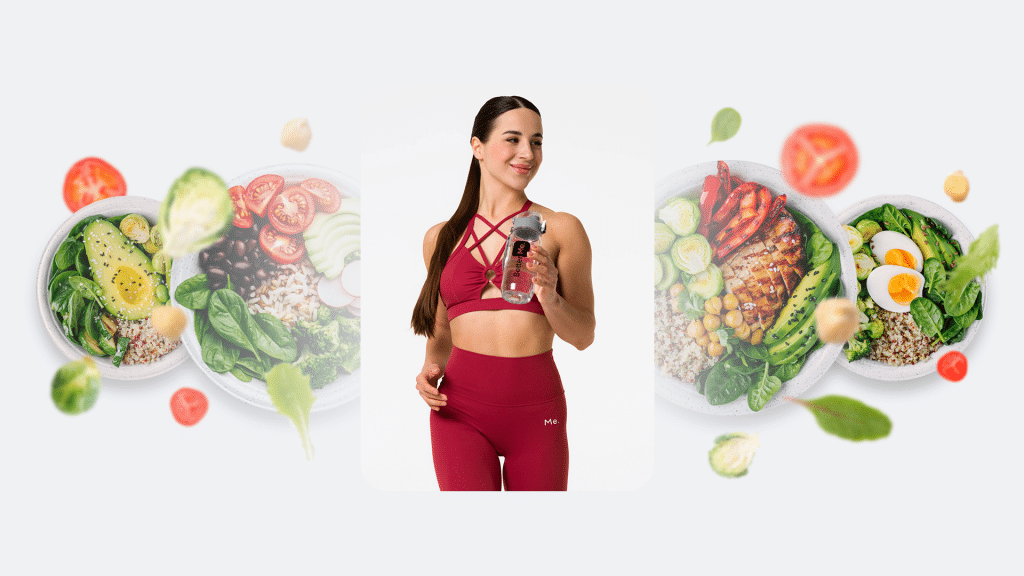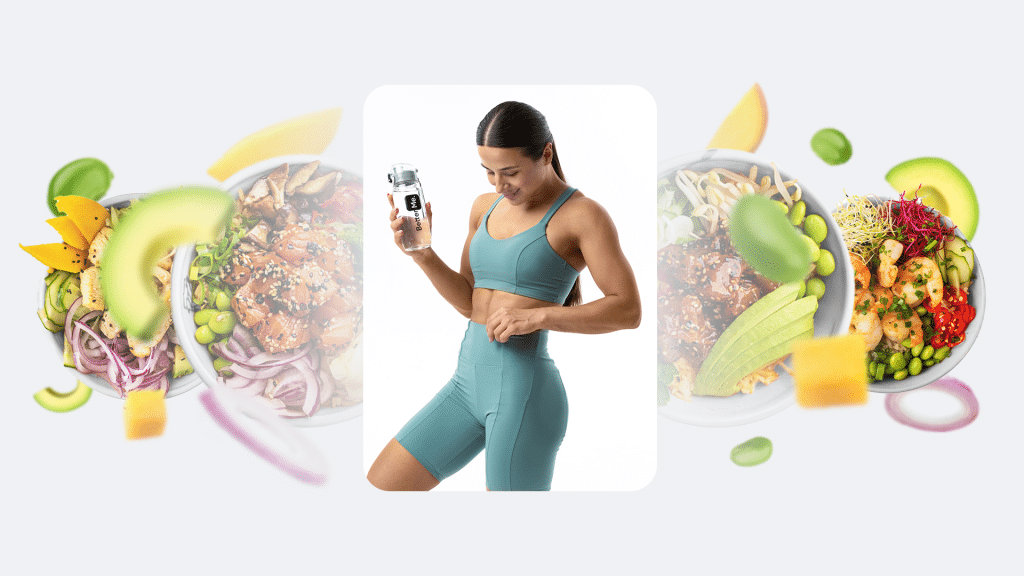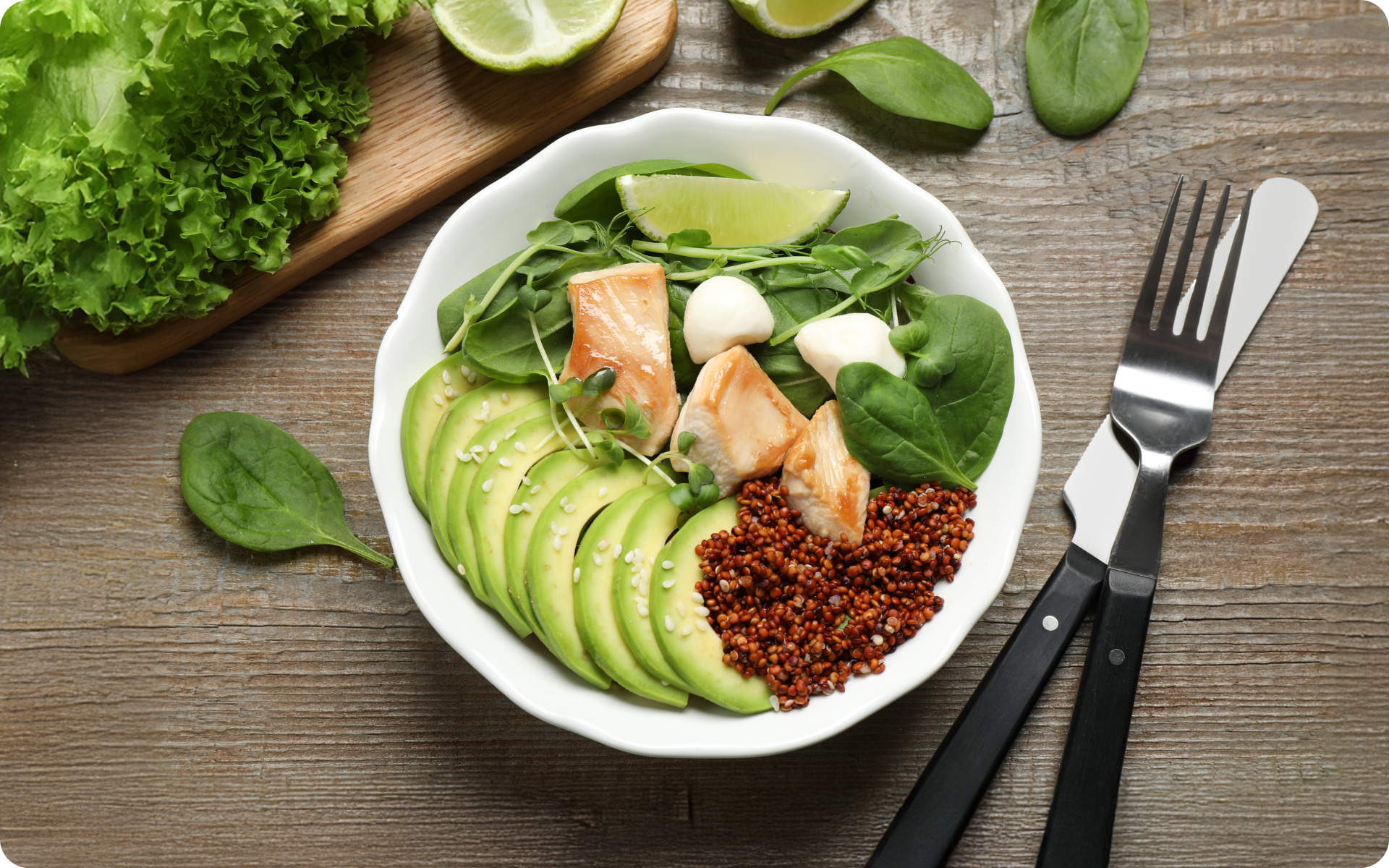A calorie deficit is the most effective way to lose weight, which means you need to consume fewer calories than your body burns every day (1).
For some people, this means consuming around 1,200-1,500 calories a day to achieve a healthy and sustainable weight loss of 1-2 pounds per week (2). However, if you’re taller or more active, you may require more calories. Each person’s energy needs are unique and based on individual factors. In this meal plan, we will be focusing on a daily calorie intake of 1,400 calories, which will be appropriate for some people, but not everyone.
To know whether this meal plan is suitable for you, it’s important to calculate your daily calorie needs using a basal metabolic rate (BMR) calculator (3). This will give you an estimate of how many calories your body burns at rest and help you determine the appropriate calorie goal for your weight loss journey.
Will I Lose Weight on 1,400 Calories a Day?
Whether you’ll lose weight on 1,400 calories a day is dependent on your individual energy needs, which are influenced by factors such as your age, sex, weight, height, and activity level. If 1,400 calories create a calorie deficit for you—meaning you consume fewer calories than your body burns—you’re likely to lose weight.
Here’s what you need to know: 1 pound of fat is equivalent to approximately 3,500 calories. This means that if you maintain a calorie deficit of 500-1,000 calories every day, you can expect to lose 1-2 pounds per week (4). This is theoretical and may vary from person to person based on factors such as genetics and metabolism, but consistently following a calorie deficit will lead to weight loss over time.
Is Eating 1,400 Calories a Day Healthy?
Eating 1,400 calories a day can be healthy if:
- You get all the essential nutrients your body needs.
- You don’t experience any negative side effects, such as fatigue or dizziness.
- You don’t follow this meal plan for an extended period of time (consult a healthcare professional if you plan to follow a low-calorie diet for more than a few weeks).
- You maintain a balanced and varied diet with plenty of fruits, vegetables, whole grains, lean proteins, and healthy fats.
A healthy 1,400-calorie meal plan should include all three macronutrients—carbohydrates, protein, and fat—in appropriate proportions. You should aim for somewhere between 45-65% carbohydrates, 10-35% protein, and 20-35% fat in your meals. This will provide you with enough energy and nutrients to support your body’s functions and keep you feeling satisfied throughout the day (5).
You can adjust your macros based on your individual needs and preferences. For example, if you’re more active, you may need slightly more protein to support muscle repair and growth. If you prefer a higher fat or lower carb diet, that can also be accommodated in this calorie range.
If you wish to free yourself from all the extra pounds that have been weighing you down for way too long, start using the BetterMe: Health Coaching app and overhaul your entire life!
Examples of healthy foods to include in a 1,400-calorie meal plan include:
Carbohydrates
Carbohydrates are an essential source of energy for the body (6). When you’re following a 1,400-calorie diet, it’s important to choose complex carbohydrates that provide sustained energy and are rich in fiber:
- Whole grains: Brown rice, quinoa, whole-wheat bread, and oats
- Vegetables: Sweet potatoes, squash, and peas
- Fruits: Apples, berries, and bananas
- Legumes: Lentils, chickpeas, and black beans
Proteins
Proteins are essential for muscle repair and growth and they keep you feeling full longer (7). Incorporating lean sources of protein is important in a reduced-calorie diet:
- Lean meats: Chicken breast, turkey, and lean cuts of beef
- Fish: Salmon, tuna, and trout
- Plant-based: Tofu, tempeh, and edamame
- Dairy: Greek yogurt, cottage cheese, and eggs
Read more: Does Protein Make You Gain Weight?
Healthy Fats
Healthy fats are vital for brain health and hormone production. Opting for unsaturated fats can support overall health while maintaining a calorie deficit (8):
- Nuts and seeds: Almonds, walnuts, and chia seeds
- Oils: Olive oil, avocado oil, and flaxseed oil
- Avocados
- Fatty fish: Mackerel and sardines
Vitamins and Minerals
Vitamins and minerals support various bodily functions and are essential for maintaining health even on a calorie-restricted diet (9). A variety of fruits and vegetables will help ensure you get a wide range of nutrients:
- Leafy greens: Spinach, kale and Swiss chard
- Cruciferous vegetables: Broccoli, cauliflower, and Brussels sprouts
- Citrus fruits: Oranges, lemons, and grapefruits
- Berries: Blueberries, strawberries, and raspberries
7-Day 1,400-Calorie Meal Plan for Weight Loss
Here’s a sample 7-day meal plan that provides around 1,400 calories per day. Feel free to adjust or swap out meals based on your dietary preferences and needs.
7-Day 1,400-Calorie Meal Plan
Day 1
1. Breakfast (350 calories)
- Scrambled eggs: 2 eggs with spinach and a dash of olive oil
- Whole-grain toast: 1 slice
- Mixed berries: 1/2 cup
2. Morning Snack (150 calories)
- Cottage cheese: 1/2 cup
- Pineapple chunks: 1/2 cup
3. Lunch (400 calories)
- Turkey sandwich: 3 ounces turkey breast, lettuce, tomato, whole-wheat bread, and mustard
- Baby carrots: 1 cup
4. Afternoon Snack (100 calories)
- Rice cakes: 2 small
- Hummus: 2 tablespoons
5. Dinner (400 calories)
- Grilled shrimp: 4 ounces
- Quinoa: 1/2 cup cooked
- Steamed asparagus: 1 cup
Day 2
1. Breakfast (350 calories)
- Greek yogurt: 1 cup plain
- Granola: 1/4 cup
- Strawberries: 1/2 cup
2. Morning Snack (150 calories)
- Hard-boiled eggs: 2
3. Lunch (400 calories)
- Mixed greens salad with chickpeas: 1 cup greens, 1/2 cup chickpeas, cherry tomatoes, cucumber, balsamic vinaigrette
- Whole-grain roll: 1 small
4. Afternoon Snack (100 calories)
- Celery sticks with almond butter: 3 sticks, 1 tablespoon almond butter
5. Dinner (400 calories)
- Baked chicken breast: 3 ounces
- Sweet potato: 1 small roasted
- Green beans: 1 cup steamed
Read more: Easy 7-Day High Protein Low Carb Diet Meal Plan
Day 3
1. Breakfast (350 calories)
- Smoothie with banana, spinach, almond milk, and protein powder
2. Morning Snack (150 calories)
- Almonds: 15
3. Lunch (400 calories)
- Lentil soup: 1 cup
- Whole-grain crackers: 6
4. Afternoon Snack (100 calories)
- Orange: 1 medium
5. Dinner (400 calories)
- Grilled tilapia: 4 ounces
- Brown rice: 1/2 cup
- Broccoli: 1 cup steamed
Day 4
1. Breakfast (350 calories)
- Whole-grain pancakes: 2 small with a small drizzle of maple syrup
- Blueberries: 1/2 cup
2. Morning Snack (150 calories)
- String cheese: 1
- Apple: 1 small
3. Lunch (400 calories)
- Quinoa salad with black beans and corn: 1 cup
- Salsa: 2 tablespoons
4. Afternoon Snack (100 calories)
- Baby bell peppers: 5
5. Dinner (400 calories)
- Beef stir-fry: 3 ounces lean beef, 1 cup mixed vegetables, 1/2 cup brown rice
Day 5
1. Breakfast (350 calories)
- Avocado toast: 1 slice whole-grain bread with 1/4 avocado
- Poached egg: 1
2. Morning Snack (150 calories)
- Mixed nuts: 1 ounce
3. Lunch (400 calories)
- Tuna salad: 3 ounces tuna, greens, cherry tomatoes, cucumber, light dressing
- Whole grain roll: 1 small
4. Afternoon Snack (100 calories)
- Carrot sticks: 1 cup
5. Dinner (400 calories)
- Baked cod: 4 ounces
- Couscous: 1/2 cup
- Roasted bell peppers: 1 cup
Day 6
1. Breakfast (350 calories)
- Chia seed pudding: 1/4 cup chia seeds, 1 cup almond milk, 1 teaspoon honey
- Sliced banana: 1 small
2. Morning Snack (150 calories)
- Baby carrots: 1 cup
- Hummus: 2 tablespoons
3. Lunch (400 calories)
- Chicken wrap: 3 ounces grilled chicken, whole-wheat wrap, lettuce, tomato, light dressing
- Grapes: 1/2 cup
4. Afternoon Snack (100 calories)
- Cucumber slices with tzatziki: 1 cup cucumber, 2 tablespoons tzatziki
5. Dinner (400 calories)
- Pork tenderloin: 3 ounces grilled
- Mashed cauliflower: 1 cup
- Snap peas: 1 cup steamed
Day 7
1. Breakfast (350 calories)
- Omelet with mushrooms and spinach: 2 eggs
- Whole-grain toast: 1 slice
2. Morning Snack (150 calories)
- Peach: 1 medium
3. Lunch (400 calories)
- Vegetable soup: 1 cup
- Whole-wheat roll: 1 small
- Side salad with vinaigrette
4. Afternoon Snack (100 calories)
- Pear: 1 medium
5. Dinner (400 calories)
- Grilled salmon: 4 ounces
- Barley: 1/2 cup cooked
- Mixed vegetables: 1 cup steamed
The calorie estimates for each day may vary, but this plan provides a general framework for creating a balanced 1,400-calorie meal plan. Cooking at home and using whole, minimally processed foods is recommended for better control over ingredients and portion sizes.
Hydration is also important in weight loss. Remember to drink plenty of water throughout the day and limit sugary drinks like soda and juice.
Whether you’re a workout beast or just a beginner making your first foray into the world of fitness and dieting – BetterMe has a lot to offer to both newbies and experts! Install the app and experience the versatility first-hand!
Tips for Successful Weight Loss on a 1,400-Calorie Meal Plan
As well as knowing what to eat, here are some additional tips for successful weight loss on a 1,400-calorie meal plan:
- Track Your Food Intake
Use a food diary or calorie tracking app to monitor your meals and snacks. This can help you stay within your daily calorie limit and make adjustments if needed.
This 1,450-Calorie Meal Plan may be a good place to start.
- Be Mindful of Portion Sizes
Even with healthy foods, it’s important to be aware of how much you’re eating (10). Using measuring cups or a food scale can help accurately portion out your meals.
- Incorporate Physical Activity
Along with a healthy diet, regular exercise is essential for sustainable weight loss (11). Aim for at least 30 minutes of moderate-intensity activity, such as brisk walking, each day.
- Don’t Skip Meals
Skipping meals may seem like a good way to cut calories, but it can backfire as it may cause you to overeat later. Stick to regular meal times and include protein, healthy fats, and fiber in each meal for sustained energy.
- Get Enough Sleep
Adequate sleep is important for weight loss as it helps regulate hormones that control hunger and fullness (12). Aim for 7-9 hours of quality sleep each night.
- Don’t Restrict Yourself Too Much
While it’s important to stay within your calorie limit, don’t deprive yourself of all your favorite foods. Allow for occasional treats in moderation to avoid feelings of deprivation and potential binge eating.
- Review and Adjust as Needed
Every person’s body is different, and what works for one person may not work for another. Regularly review your progress and make adjustments as needed to find the right balance for you. Don’t hesitate to seek help from a registered dietitian or nutritionist if necessary.
- Seek Support
Weight loss can be challenging, so it’s important to have a support system. Consider joining a weight loss group or finding an accountability partner to help you stay motivated and on track.
Consuming 1400 calories a day may not be considered starving for some individuals, but it can be too low for others, depending on factors such as age, sex, weight, height, and activity level. It’s important to ensure that your diet provides all essential nutrients. Consulting a healthcare provider or registered dietitian can help determine if this calorie level is appropriate for you. A 1,400-calorie deficit is generally too large and unsustainable for most people. A safe and effective calorie deficit usually ranges from 500 to 1,000 calories per day, which can lead to a weight loss of approximately 1-2 pounds per week (4). Exceeding this deficit may lead to nutritional deficiencies and health issues. Consuming too few calories over an extended period can lead to a slowdown in metabolism as the body adapts to conserve energy (13). It’s important to ensure your calorie intake supports basic metabolic functions and activity levels to prevent metabolic slowdown. Whether 1,400 calories is too few for you will depend on your individual energy needs. Eating nutrient-dense foods and maintaining regular physical activity can help sustain a healthy metabolism. For many women, 1,400 calories may be too low, particularly if they are active or have a higher basal metabolic rate. Individual calorie needs vary greatly, and it’s important to calculate your specific requirements based on personal factors. Seeking guidance from a registered dietitian can help ensure you meet your energy and nutrient needs. To eat 1,400 calories a day, plan your meals and snacks carefully to ensure you meet your nutritional needs while staying within the calorie limit. Focus on whole foods such as fruits, vegetables, lean proteins, whole grains, and healthy fats. Divide your calorie intake among three balanced meals and two snacks, and monitor portion sizes to avoid overeating. A 1,400-calorie day may include a breakfast of oatmeal with berries and almond butter, a morning snack of Greek yogurt with nuts, a lunch of grilled chicken salad, an afternoon snack of an apple with peanut butter, and a dinner of baked salmon with quinoa and vegetables. This structure provides variety and essential nutrients while keeping within the calorie limit. The amount of weight you can lose on 1,400 calories a day depends on your individual energy needs and the calorie deficit you create. If 1,400 calories is below your maintenance level, you can expect to lose weight. Factors such as age, sex, and activity level will influence your results, so it’s important to monitor your progress and adjust as needed. To stay full on 1,400 calories a day, you should choose foods that are high in fiber and protein, as they promote satiety. Incorporate vegetables, legumes, whole grains, and lean proteins into your meals. Drinking plenty of water and eating slowly can also help you feel fuller longer. Spacing out meals and snacks throughout the day can prevent hunger pangs. Here are some meal ideas for a 1,400-calorie day:Frequently Asked Questions
Is 1,400 calories starving yourself?
Is a 1,400-calorie deficit too much?
Will 1,400 calories slow my metabolism?
Is 1,400 calories too low for a woman?
How can I eat 1,400 calories a day?
What does 1,400 calories a day look like?
How much weight can I lose on 1,400 calories a day?
How can I eat 1,400 calories a day and stay full?
What are some 1,400-calorie-a-day meal ideas?
The Bottom Line
Achieving sustainable weight loss involves consuming fewer calories than the body expends, with a typical range of 1,200-1,500 calories per day being effective for losing 1-2 pounds a week for some people.
Maintaining a balanced diet rich in essential nutrients, derived from a mix of carbohydrates, proteins, and healthy fats is critical to this approach. The meal plan provided in this article serves as a practical guide for structuring daily meals, ensuring variety and nutritional balance.
Individual factors such as age, sex, and activity level significantly influence calorie needs, which makes it important to tailor the plan to personal requirements. Consulting a healthcare provider or registered dietitian is recommended to determine the appropriateness of a 1,400-calorie intake for your specific health profile.
DISCLAIMER:
This article is intended for general informational purposes only and does not serve to address individual circumstances. It is not a substitute for professional advice or help and should not be relied on for making any kind of decision-making. Any action taken as a direct or indirect result of the information in this article is entirely at your own risk and is your sole responsibility.
BetterMe, its content staff, and its medical advisors accept no responsibility for inaccuracies, errors, misstatements, inconsistencies, or omissions and specifically disclaim any liability, loss or risk, personal, professional or otherwise, which may be incurred as a consequence, directly or indirectly, of the use and/or application of any content.
You should always seek the advice of your physician or other qualified health provider with any questions you may have regarding a medical condition or your specific situation. Never disregard professional medical advice or delay seeking it because of BetterMe content. If you suspect or think you may have a medical emergency, call your doctor.
SOURCES:
- The Effects of a Calorie Deficit on Body Composition Josie Sherman (2020,stmarys-ca.edu)
- Effect of Degree of Weight Loss on Health Benefits (n,d,onlinelibrary.wiley.com)
- DRI Calculator for Healthcare Professionals (n,d,usda.gov)
- Steps for Losing Weight (2023,cdc.gov)
- Macronutrients: A Simple Guide to Macros (2019,avitahealth.org)
- Physiology, Carbohydrates (2023,nih.gov)
- Why is protein important in your diet? (2024,piedmont.org)
- Eating healthy fats has many benefits (2022,uclahealth.org)
- Vitamins and minerals explained (2024,healthdirect.gov.au)
- Role of Portion Size in the Context of a Healthy, Balanced Diet: A Case Study of European Countries (2023,nih.gov)
- The Role of Exercise and Physical Activity in Weight Loss and Maintenance (2015,nih.gov)
- The role of sleep in the regulation of body weight (2015,nih.gov)
- Impact of calorie restriction on energy metabolism in humans (2022,nih.gov)












